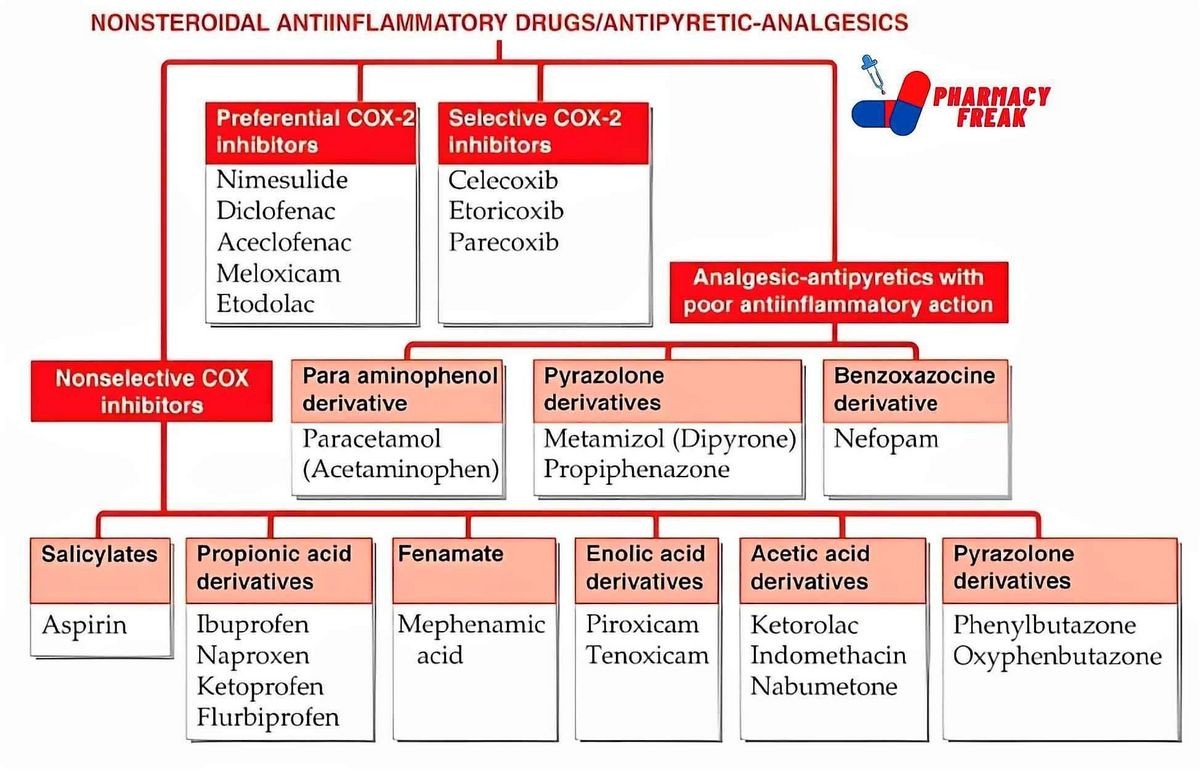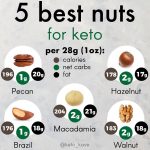
Nonsteroidal Anti-inflammatory Drugs (NSAIDs)
Prostaglandins are chemicals produced by the body’s cells and serve various functions. They promote inflammation necessary for healing, but also cause pain and fever. Prostaglandins also support blood clotting and protect the stomach lining from acid damage.
Prostaglandins are produced by the enzyme cyclooxygenase (COX) in the body’s cells. There are two types of COX enzymes, COX-1 and COX-2. Both enzymes produce prostaglandins that promote inflammation, pain, and fever. However, only COX-1 produces prostaglandins that support blood clotting and protect the stomach.
Nonsteroidal anti-inflammatory drugs (NSAIDs) block the COX enzymes, reducing prostaglandin production in the body. This reduces ongoing inflammation, pain, and fever. However, NSAIDs can also cause stomach ulcers and bleeding because they also reduce the prostaglandins that protect the stomach and support blood clotting.
NSAIDs are primarily used to treat inflammation, mild to moderate pain, and fever.
Specific uses of NSAIDs include the treatment of:
- headaches
- arthritis
- ankylosing spondylitis
- sports injuries
- menstrual cramps
NSAID examples
- Ketorolac (Toradol) is used for short-term treatment of moderately severe acute pain.
- Aspirin is used to inhibit blood clotting and prevent strokes and heart attacks in high-risk individuals.
- NSAIDs are included in many cold and allergy preparations.
- Celecoxib (Celebrex) is used to treat familial adenomatous polyposis (FAP) and prevent colon polyp growth.
NSAID warnings
- Some individuals may be allergic to NSAIDs and experience shortness of breath. People with asthma are at higher risk for serious allergic reactions to NSAIDs.
- Use of aspirin in children and teens with chickenpox or influenza can cause Reye’s syndrome, a serious liver disease.
- NSAIDs increase the risk of stomach and intestinal adverse reactions (bleeding, ulcers, perforation). Elderly patients are at greater risk.
- NSAIDs (except low-dose aspirin) may increase the risk of heart attacks, stroke, and related conditions. They should not be used for pain resulting from coronary artery bypass graft (CABG) surgery.
What NSAIDs are FDA approved in the United States?
There are several FDA-approved NSAIDs, including:
- Aspirin
- Celecoxib (Celebrex)
- Diclofenac (Cambia, Cataflam, Voltaren-XR, Zipsor, Zorvolex)
- Diflunisal (Dolobid – discontinued brand)
- Etodolac (Lodine – discontinued brand)
- Ibuprofen (Motrin, Advil)
- Indomethacin (Indocin)
- Ketoprofen (Active-Ketoprofen [Orudis – discontinued brand])
- Ketorolac (Toradol – discontinued brand)
- Nabumetone (Relafen – discontinued brand)
- Naproxen (Aleve, Anaprox, Naprelan, Naprosyn)
- Oxaprozin (Daypro)
- Piroxicam (Feldene)
- Salsalate (Disalsate [Amigesic – discontinued brand])
- Sulindac (Clinoril – discontinued brand)
- Tolmetin (Tolectin – discontinued brand)
QUESTION
What are the side effects of NSAIDs?
NSAIDs have several side effects, which vary among medications.
Common side effects include:
Other important side effects include:
- Kidney failure
- Liver failure
- Ulcers
- Prolonged bleeding after injury or surgery
NSAIDs can also cause fluid retention, leading to ankle swelling.
What are the differences among NSAIDs?
NSAIDs vary in potency, duration of action, how they are eliminated from the body, how strongly they inhibit COX-1 vs COX-2, and their propensity to cause ulcers and promote bleeding. NSAIDs that block COX-2 but have little effect on COX-1 are classified as selective COX-2 inhibitors, causing fewer ulcers and bleeding.
- Celecoxib (Celebrex) is a selective COX-2 inhibitor.
- Aspirin is unique because it inhibits blood clotting for a prolonged period, making it ideal for preventing heart attacks and strokes.
- Ketorolac (Toradol) is a potent NSAID used for short-term treatment of moderately severe acute pain. It causes ulcers more frequently and is not used for more than five days.
Different individuals may respond differently to different NSAIDs.
What drugs do NSAIDs interact with?
- Diuretics: NSAIDs reduce the action of diuretics and decrease the elimination of lithium and methotrexate.
- Blood thinners: NSAIDs increase bleeding and may lead to serious bleeding when used with other drugs that also increase bleeding.
- Blood pressure medications: NSAIDs may increase blood pressure and counteract antihypertensive drugs.
- Cyclosporine: NSAIDs worsen the negative effect of cyclosporine on kidney function.
- Alcohol: People who consume more than three alcoholic beverages per day are at an increased risk of stomach ulcers when taking NSAIDs.
By clicking Submit, I agree to the MedicineNet’s Terms & Conditions & Privacy Policy and understand that I may opt out of MedicineNet’s subscriptions at any time.
Summary
Nonsteroidal anti-inflammatory drugs (NSAIDs) are used to treat inflammation, mild to moderate pain, and fever. Common examples include aspirin, salsalate, ibuprofen, ketoprofen, nabumetone, piroxicam, naproxen, diclofenac, indomethacin, sulindac, tolmetin, etodolac, ketorolac, oxaprozin, and celecoxib.


